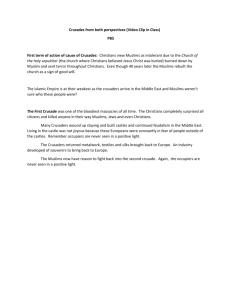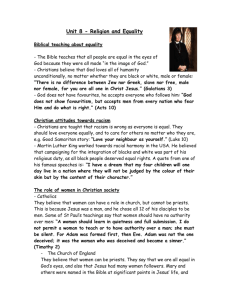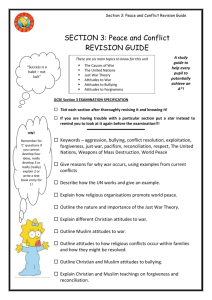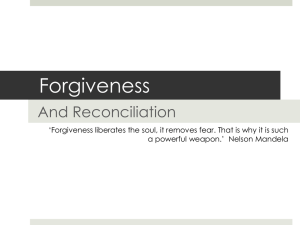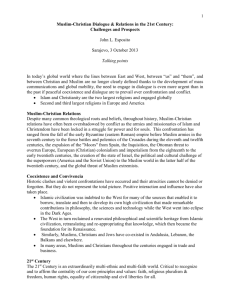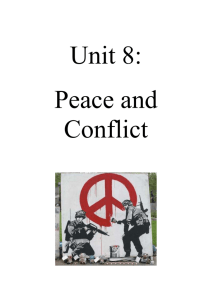8.3 REVISION DOCUMENT peace & conflict
advertisement
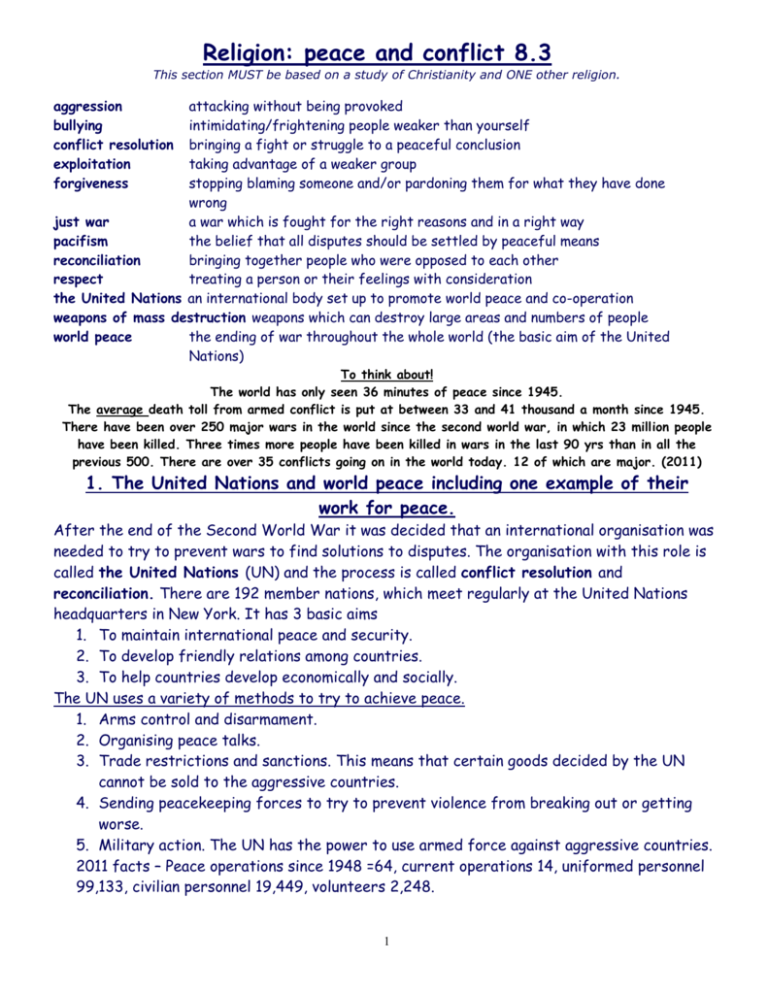
Section 8.3 Religion: peace and conflict 8.3 This section MUST be based on a study of Christianity and ONE other religion. aggression bullying conflict resolution exploitation forgiveness attacking without being provoked intimidating/frightening people weaker than yourself bringing a fight or struggle to a peaceful conclusion taking advantage of a weaker group stopping blaming someone and/or pardoning them for what they have done wrong just war a war which is fought for the right reasons and in a right way pacifism the belief that all disputes should be settled by peaceful means reconciliation bringing together people who were opposed to each other respect treating a person or their feelings with consideration the United Nations an international body set up to promote world peace and co-operation weapons of mass destruction weapons which can destroy large areas and numbers of people world peace the ending of war throughout the whole world (the basic aim of the United Nations) To think about! The world has only seen 36 minutes of peace since 1945. The average death toll from armed conflict is put at between 33 and 41 thousand a month since 1945. There have been over 250 major wars in the world since the second world war, in which 23 million people have been killed. Three times more people have been killed in wars in the last 90 yrs than in all the previous 500. There are over 35 conflicts going on in the world today. 12 of which are major. (2011) 1. The United Nations and world peace including one example of their work for peace. After the end of the Second World War it was decided that an international organisation was needed to try to prevent wars to find solutions to disputes. The organisation with this role is called the United Nations (UN) and the process is called conflict resolution and reconciliation. There are 192 member nations, which meet regularly at the United Nations headquarters in New York. It has 3 basic aims 1. To maintain international peace and security. 2. To develop friendly relations among countries. 3. To help countries develop economically and socially. The UN uses a variety of methods to try to achieve peace. 1. Arms control and disarmament. 2. Organising peace talks. 3. Trade restrictions and sanctions. This means that certain goods decided by the UN cannot be sold to the aggressive countries. 4. Sending peacekeeping forces to try to prevent violence from breaking out or getting worse. 5. Military action. The UN has the power to use armed force against aggressive countries. 2011 facts – Peace operations since 1948 =64, current operations 14, uniformed personnel 99,133, civilian personnel 19,449, volunteers 2,248. 1 A case study –The United Nations in Darfur. There was conflict between the anti-government groups in Darfur (an area of Sudan) and the Sudanese government. Step 1. The UN stepped in to negotiate peace talks. In May 2004 the Sudanese government met with the UN secretary general. Following the talks there was a joint agreement between the United Nations and the Sudanese government to stop the conflict in Darfur.The government agreed to resume peace talks with the anti-government troops and disarm the Janjaweed. (An Arab military group) It did neither. Various peace deals have been signed but failed. However the UN at least gets them to negotiate. Step 2. Sanctions were suggested and carried out by some individual countries but the UN voted against them. Step 3. After UN negotiations (and the threat of sanctions) with the Sudanese government, a small peacekeeping force (300) from the African Union was allowed in Darfur in 2004. In 2007 a combined peacekeeping force was sent in of 26,000 troops. In 2011 20,000 remained. 89 UN soldiers have lost their lives in Darfur. They have had some success. 2. How religious organisations try to promote world peace. The World council of Churches. (WCC) They bring together Christians from all over the world to work for world peace. They get those in disputes, particularly religious ones to talk to each other and try to achieve reconciliation. It was followed in 1948 in order to follow the teachings of Jesus about forgiveness, peace and unity among all peoples. PAX CHRISTI.= Peace of Christ. This was founded by Roman Catholics in 1945 to promote reconciliation between French and German Catholics after the violence of the 2nd world war. Pax Christi is now international and works in 50 countries on 5 continents. It is dedicated to reflecting the ‘Peace of Christ’. It is opposed to war and violence and tries to get governments to solve their disputes with other nations through discussion, and economic and social justice. Islamic Relief and the Muslim Peace Fellowship. (both are NGO’s) Islamic Relief was founded in 1984, its motto is ‘dedicated to alleviating the poverty and suffering of the worlds poorest people. It campaigns all over the world to help the victims of war. In recent years it has worked in many parts of Africa, India, Bosnia, Somalia and Iraq. The Muslim Peace Fellowship (Ansar as-Salam) works to promote world peace. Founded in 1994 as ‘a gathering of peace and justice-orientated Muslims of all backgrounds who are dedicated to make the beauty of Islam evident in the world’. It aims to: Work against injustice Reach out to people of all faiths with a message of understanding and mutual respect Work with everyone to bring about world peace. 2 3. Why wars occur, using examples from current conflicts. War is an armed conflict between two or more nations. The main cause are: self defence, fear of attack, national pride, to fight against aggression and injustice, because of long standing or ethnic hatred, economics or natural resources –water, land, oil, and to protect people from persecution and exploitation. Every war is unique and is often caused by a combination of factors. In DARFUR war was caused by several factors: Economic and environment. Years of drought and increasing desertification have meant food and water was scarce. So people moved onto farmland owned by other people who are also struggling to survive. Long-standing ethnic hatred. Both sides are divided on religious and ethnic lines. National Pride. Some parts of the anti-government forces want the south of Sudan to become an independent country; others want it to stay as one country. Remote location. This meant that it took a long time for people in other countries to know what was happening and try to do something about it. By which time thousands had already died or been displaced. 4. The nature and importance of the theory of just war. Just War – a war that is fought for the right reasons and in the right way. Christianity accepts that there can be such a thing as a ‘just war.’ A just war should satisfy certain conditions as developed by Thomas Aquinas. Proper Authority – A war must be declared by a proper authority e.g. An elected government, a president or a monarch. Just Cause – A war must have a just cause e.g. self-defence or reclaiming lost territory. Just Aim – A war must have a just aim and should stop when that aim has been achieved e.g. to restore peace. Discrimination – A war must be waged without endangering civilians i.e. with discrimination, although bombs can be aimed at armaments factories and accidentally hit hospitals. Proportionality – A war must be waged without undue force. i.e.: with proportionality. e.g. don’t use a nuclear missile against someone with a bow and arrow. Last Resort – A war must only be begun as a last resort, i.e. all non violent methods of ending a dispute have been tried and failed. Chance of Success – A war must have a reasonable chance of success; i.e. lives should not be wasted if there is no chance of achieving the aims. 3 Christians believe in the Just War theory BECAUSE: St. Paul said in Romans 13 and Titus 3 that Christians have to obey the orders of the government; Jesus never condemned the soldiers he met and actually commended the faith of the Roman Centurion in Luke 7; ‘Remind the people to be subject to rulers and authorities to be obedient, to be ready to do whatever is good.’ Titus 3;1 When Jesus was asked about paying taxes he said, ‘Give to Caesar what is Caesar’s’ which must mean fighting in a just war ordered by the government is OK; If we need a police force to protect innocent people against criminals, we need armed forces to protect innocent states against criminal ones. ’He said (Jesus) to them, ‘But if you have a purse, take it, and also a bag; and if you don’t have a sword, sell your cloak and buy one.’ Luke 22;36 5. Differences among Christians in their attitudes to war and the reasons for them. 1. Should a Christian go to war? The Bible has a message of peace and most Christians believe that they should work towards establishing peace and ending war. Indeed one of the titles given to Jesus was ‘Prince of Peace’. The New Testament continually encourages Christians to seek peace, reconciliation and forgiveness BECAUSE the teachings of Jesus state: ‘Blessed are the peacemakers, for they shall be called the children of God’. ‘Do not resist an evil person. If someone strikes you on the right cheek, turn to him the other also. ’ ‘Love your enemies, bless those who curse you, do good to those who hate you, and pray for those who treat you badly and persecute you.’ ‘For all who draw the sword will die by the sword’. 2. Pacifism. This is the belief that war and physical violence are wrong under any circumstances. There are 3 types of pacifism (i)Absolute pacifism: no engagement in military activity at all. (ii)Relative or selective pacifism: no engagement in military activity in certain circumstances. (iii)Nuclear pacifism: no use of nuclear weapons. A number of Christian groups, such as Quakers, Plymouth Brethren and Pax Christi have all refused to engage in any kind of violent struggle and have declared that they will not resist those who attack them. The reasons for Christian Pacifism are BECAUSE … The Ten Commandments forbid killing, ‘You shall not commit murder.’ Jesus taught that people should love their enemies. Jesus stopped his own followers from using violence. Nuclear weapons and weapons of mass destruction can cause unimaginable suffering on innocent people. 4 A pacifist would say: - ‘All war and violence is morally wrong. Violence only breeds violence and it may solve a problem in the short run but not in the long run. Nothing good can come out of something evil. We have been fighting wars for thousands of years – millions of people have died. The world today is not better off; in fact we live in the most dangerous period of history ever. Pacifism has never been tried – to be unarmed means taking risks, but to be armed is no less risky.’ 3. Christianity and the Just War theory. The Just War theory is now accepted by most Christian Churches and has been used to justify many recent wars, including the World Wars, the Falklands War and the Gulf War. The reasons for this are BECAUSE: Jesus told the people they should obey the lawful government,’ Give to Caesar what is Caesar’s and to God what is God’s.’ St Paul told the people that Christian’s have a duty to obey those in authority, ‘Everyone must submit himself to the governing authorities, for there is no authority except that which God has established. Jesus told his disciples, ‘…if you don’t have a sword, sell you cloak and buy one’. This means that violence may sometimes be necessary. Some Christians would say that sometimes war is the lesser of two evils. Some Christians also claim that it is right to have armed forces to protect the nation from enemies. 6. Attitudes to war of one religion other than Christianity and the reasons for them GREATER JIHAD – the struggle to make society and self perfectly Muslim (struggling with self and desires, not fighting). LESSER JIHAD – the struggle with forces outside of yourself by means of war. 1. Muslim views in favour of war. Military (lesser) jihad has very strict rules and is similar to the Christian idea of a ‘just war.’ It is justified if it will bring about freedom from tyranny; restore peace, combat oppression, or right injustice. It must not be used to colonise, suppress or impose Islam on non-believers. The sick, the elderly, women and children should not be harmed, the natural world should not be damaged, and indiscriminate killing should be avoided. Jihad must be in the name of Allah and according to his will. A religious leader, not any politician, must declare it. It must be a last resort. It must be ended as soon as the enemy lays down his arms. 5 The reasons for this view are BECAUSE; The Qur’an says that Muslims must fight if they are attacked; Muslims believe the Qur’an is the word of God. Muhammad fought in wars. Muhammad made many statements (hadith) about war saying that Muslims must fight in just wars. The Qur’an says that dying in the service of Allah turns a Muslim into a martyr; true martyrs go straight to paradise as an instant reward 1. Muslim views against war A growing number of Muslims believe that war or armed forces is never the right response, they believe this BECAUSE: Peace and reconciliation is at the heart of Islam and the teachings of the Qur’an. Modern weapons (especially nuclear weapons) cannot possibly be used in a way that is compatible with the Muslim rules about fighting in a war-innocent civilians will always be injured and killed. Violence only leads to more violence even if the ‘enemy surrenders’. War only increases hatred and distrust between both sides and therefore never leads to lasting peace. There are Muslim organisations that are founded on these principles and that try to help find peaceful solutions to conflict and speak out against war. One of these is the Muslim Peace Fellowship whose motto is: ‘Whatever act of violence has just taken place, we deplore it.’ 7. Christian attitudes to bullying and the reasons for them. Intimidating or frightening people who are weaker than yourself. Bullying takes place in all walks of life, school, and work, in families and at play. It is often done by those who are bigger and stronger amongst children and by those who use positions of power to frighten and humiliate adults at work. Bullying can cause physical and mental injury sometimes leading to suicide or murder. There are many reasons why people bully: Have problems in their home and family life Have been victims of bullying themselves. Want to look tough Dislike themselves, and take this out on their victims. There are no differences of opinion about bullying in Christianity- all Christians believe bullying is wrong BECAUSE: All bullying involves physical or verbal violence without a just cause, which is against Christian teaching. Christians believe that every individual is made in the image of God, so bullying is wrong. The Golden Rule –treat others as you would like others to treat you. Jesus taught people to treat each other with respect and to protect the weak and vulnerable. The Bible teaches that taking revenge is not allowed except by God. Christians believe that everyone will be judged according to the way they have lived their lives. BULLYING. – 6 8. Muslim attitudes to bullying and the reasons for them. The Qur’an teaches ‘Let there arise out of you a band of people inviting to all that is good, enjoying what is right, and forbidding what is wrong’. This makes it clear that all Muslims should work together to challenge any wrongdoing and anything that causes harm. This includes bullying BECAUSE: Islam teaches that any type of violence without just cause is wrong. Muslims believe that every individual has been created by Allah and it is wrong to abuse God’s creation. Islam teaches that Muslims should work to put an end to injustice and cruelty which includes bullying. Muhammad taught that people should protect and help the weak and vulnerable, not attack them. All Muslims believe that on the last day they will be judged by God on the way they have lived their lives. 9. Religious conflicts within families. Causes of conflict in families. Jealousy because of financial or job success, e.g. winning the lottery. Parents refusing to accept a child’s choice of partner. Disagreement over caring for elderly parents. Disagreement over the contents of wills. Disagreements over moral issues e.g. a friend or child deciding to cohabit rather than marry, a friend deciding to have an abortion. 1 2 3 4 Conflicts between friends can lead to the ending of a friendship. Within families it can lead to the violence of battered wives or husbands and different groups in the family refusing to have anything to do with each other etc. Causes of religious conflict in families Religion and religious issues can cause conflict within a family, whether that family is religious or not. E.G. A child who has had a religious upbringing may convert to a different religious faith, which would worry and concern their parents and other family members. A child of atheist parents may become religious, which their parents may find very difficult to understand, especially since it is likely to involve a lifestyle change. They may therefore have different views about such things as: social behaviour, (e.g. alcohol and sex). Moral issues (e.g. partners, marriage, abortion). Jobs and careers. (E.g. if the children of a pacifist became a soldier). Raising children, in a faith or not? How religious families deal with conflict. 7 Religions teach that the relationship between family members should be based on mutual love, respect and responsibility. Islam teaches that no child should cause harm to their parent and neither should parents cause any harm to their child. Muslims are called to obey their parents even in adulthood, and to accept the authority that their wisdom and experience grants them. Christianity teaches that children should honour their parents, but parents too are called on not to ‘provoke your children to anger’. 10. Christian teachings on forgiveness and reconciliation Christianity is based on the concept of forgiveness and reconciliation. Many Christians believe that humanity had become separated from God through sin, but the forgiveness of sins through the death of Jesus, God’s son, means that God and humans have been reconciled (brought back together). Forgiveness and love can lead to reconciliation and the ending of conflict between humans. Christians believe this because; Jesus died on the cross to bring forgiveness and reconciliation. Jesus said that we should carry on forgiving.’Then Peter came to Jesus and asked, ‘Lord, how many times shall I forgive my brother when he sins against me? Up to seven times?’ Jesus answered ‘I tell you not seven times, but seventy times seven.’ Matthew 18; 21-22. God will only forgive the sins of those who forgive others. ‘And when you stand praying, if you hold anything against anyone, forgive him, so that your father in Heaven may forgive your sins.’ Mark11; 26. St. Paul said we should try and live in peace with everyone. ‘If anyone has caused grief….you ought to forgive and comfort him. 2 Corinthians 2; 7. HOWEVER! Christians would say that if the quarrel is about a religious or moral issue and the person quarelled with is going against Christian beliefs, then there can be no reconciliation. Christian beliefs should not be given up for either friends or family. 11. The teachings on forgiveness and reconciliation of Islam. Islam teaches that God is merciful and that those who truly repent their sins will be forgiven. Muslims believe they should be forgiving because; God is compassionate and merciful to sinners, so Muslims should be merciful and forgiving. Can Muslims ask God for forgiveness on the Day of Judgement if they do not forgive others? The Qur’an says that Muslims should forgive. The Hadith tells about the Prophet Muhammad forgiving. Muslims should follow his example. HOWEVER! Muslims should not forgive those who are working against Islam, or those who are denying Muslim principles. 8

